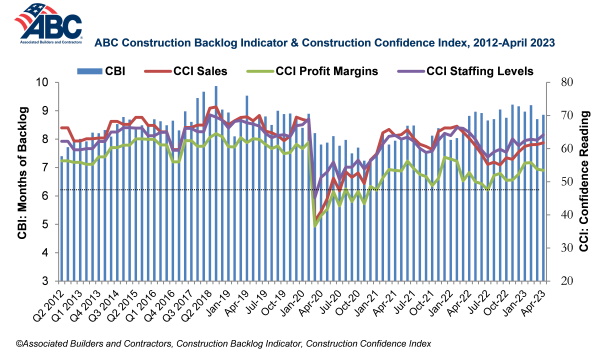Associated Builders and Contractors (ABC) has reported a rebound in its Construction Backlog Indicator for April. The indicator increased from 8.7 months in March to 8.9 months in April, according to an ABC member survey conducted between April 20 to May 3. This reading is 0.1 months higher than in April 2022.
The increase in backlog can be attributed to the strength in the infrastructure category, which helped offset the decline in March backlog to a seven-month low. Regionally, backlog increased in the Northeast and West but fell in the South and Middle states.
ABC’s Construction Confidence Index reading for sales and staffing moved higher in April, while the readings for profit margins inched lower. All three readings remain above the threshold of 50, indicating expectations of growth over the next six months.
According to ABC Chief Economist Anirban Basu, “Based on ABC member sentiment, one would not be able to discern that interest rates are high, the nation’s banking sector is in tumult, politicians are arguing over the nation’s debt limit, and recession fears remain pervasive. Despite many headwinds and an active news cycle, contractors continue to express confidence in the near term.”
However, Basu did mention that there is some evidence of a shift. With credit conditions tightening, expectations are that private construction is poised for weaker times ahead. Nonetheless, backlog expanded in April as infrastructure contractors began to take on more public works projects. Moreover, despite rapidly rising compensation costs, more ABC contractors expect profit margins to expand as opposed to recede over the next six months, evidence of sufficiently strong demand for construction services to support pricing power.
Despite the various economic challenges faced by the industry, ABC members remain confident about the future growth of the construction sector. The strength in infrastructure projects and public works is a positive sign for the industry, even as private construction may face some setbacks due to tightening credit conditions.



